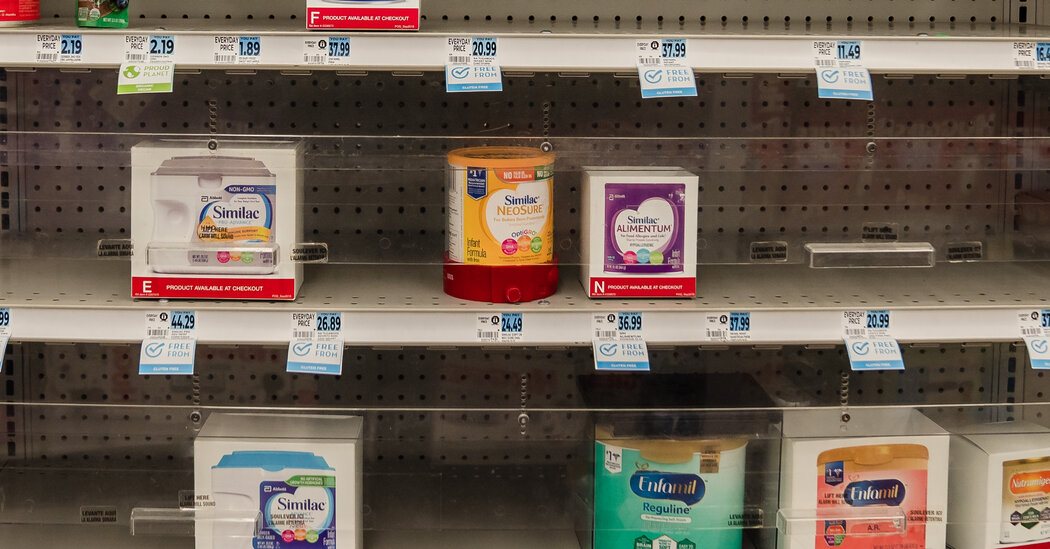
WASHINGTON — The Biden administration said on Thursday that it was working to address a worsening nationwide shortage of infant formula, announcing efforts to speed manufacturing and increase imports as pressure mounted to respond to a crisis that has desperate parents scouring empty store aisles to feed their children.
Officials outlined the plan after President Biden met with retailers and manufacturers, including Walmart, Target, Reckitt and Gerber, about their efforts to increase production. They also discussed steps the federal government could take to help stock bare shelves, particularly in rural areas, according to senior administration officials who spoke on the condition of anonymity to detail the conversation.
After the meeting, the White House announced a series of modest moves to increase supply, including pushing states to waive packaging regulations to allow manufacturers to get formula on store shelves more quickly. The administration is also instructing the Federal Trade Commission and state officials to crack down on price gouging and calling on companies to institute buying limits, the officials said.
And they said that in the coming days, the Food and Drug Administration would announce that the United States would begin importing more formula. They listed Mexico, Chile, Ireland and the Netherlands as the key sources of such imports.
Still, the officials conceded that Americans would not necessarily see any immediate relief.
The announcement came as Republicans, sharpening their attacks on Mr. Biden and Democrats before midterm congressional elections, sought to weaponize the baby formula shortage. It was further evidence for their claim that unified Democratic rule in Washington had led to inflation, high gas prices and other economic challenges, they said.
“The steps the president took today are an acknowledgment and a recognition that more needs to be done,” the White House press secretary, Jen Psaki, said on Thursday. “Our message to parents is, we hear you, we want to do everything we can and we’re going to cut every element of red tape to help address this and make it better for you, to get formula on the shelves.”
The shortage is expected to last for months as the government and retailers try to address a shortfall in production that began in February after a voluntary recall of several lines of powdered formula. That month, Abbott Nutrition, the country’s largest manufacturer of infant formula, had to close its plant in Sturgis, Mich., because of concerns about bacterial contamination after four infants became sick, two of whom died.
Senior administration officials said on Thursday they had no estimate for when the plant would reopen, or when parents searching for baby food would see an increase in the products available on the shelves. Pressed on which agency Americans should contact if they could not find formula, Ms. Psaki acknowledged the limits of how the administration could help. “We would certainly encourage any parent who has concerns about their child’s health or well-being to call their doctor or pediatrician,” she said.
In the meantime, officials said they were encouraging states to cut down on regulations for manufacturers, such as package size requirements, so they could streamline and increase production.
The Biden administration has been under increasing political pressure to address the crisis, not just from Republicans who have incorporated it into their midterm playbook, but also from Democrats who are facing challenging re-election contests.
“I’m not satisfied until there is food on the shelves,” Representative Abigail Spanberger, Democrat of Virginia, who is up for re-election, said in an interview. She said that immediately after appearing on television to discuss the shortage, she received a call from Ron Klain, the White House chief of staff.
“They are working it with a level of urgency,” Ms. Spanberger said. “Could they convey it more aggressively? I wish everyone was hair-on-fire apoplectic over it.”
She added that she and Mr. Klain had discussed invoking the Defense Production Act to increase production, and that officials had indicated they were considering the move. She said they also discussed removing tariffs that would allow the United States to get imported formula onto American shelves more quickly.
House Democrats have announced two hearings on the issue in the next two weeks.
At a news conference on Capitol Hill on Thursday, House Republicans blamed Mr. Biden for the shortage, saying his administration had failed to plan for it and calling it his latest failure to deal with the economic challenges facing voters.
The focus on the formula crisis dovetailed with the message Republicans hoped would win them victories in November: that Mr. Biden and Democrats have been feckless on issues like inflation and rising gas prices that matter most to regular Americans.
Representative Elise Stefanik, Republican of New York, said the administration should have had a plan for the shortage months ago, while others faulted the president for simply making family life more difficult across the board.
Navigating the Baby Formula Shortage in the U.S.
A growing problem. A nationwide shortage of baby formula — triggered in part by supply-chain issues and worsened by a recall by the baby food manufacturer Abbott Nutrition — has left parents confused and concerned. Here are some ways to manage this uncertainty:
“My son, Sam, is 9 months old; he’s formula-fed,” Ms. Stefanik, the No. 3. House Republican, said, noting that parents were racking up high gas bills as they drove around hunting for formula. “The shelves have been fairly empty.”
Though the event was focused on the most basic of human needs, hard-right Republicans transformed it into a forum for airing some of their favorite attacks against Mr. Biden, trying to tie the formula shortage to his border policies and even efforts to reduce drug overdoses.
“Pictures are emerging today from the border, where the Biden administration has been sending pallets of baby formula for illegal mothers and their babies while American mothers and babies cannot find baby formula,” said Representative Marjorie Taylor Greene, Republican of Georgia.
A White House official said that since 1997, it has been compulsory under the law for border personnel to have nutrition, including baby formula, for people and infants taken into custody. The official noted that the Trump and the George W. Bush administrations followed that policy.
Representative Mike Waltz, Republican of Florida and the father of a 4-month-old, floated a hypothetical that he was heard workshopping with colleagues before the news conference.
“Think about the fact that in Joe Biden’s America, it seems like it’s easier to get a crack pipe in a government-funded smoking kit than it is to find baby formula,” he said.




